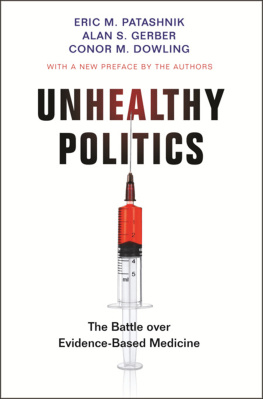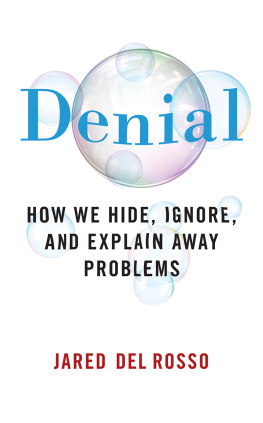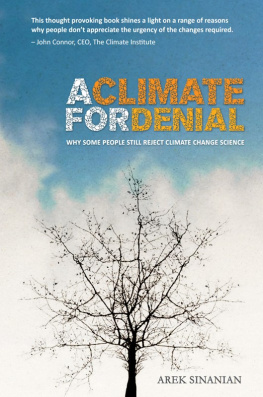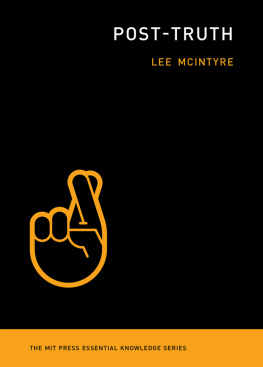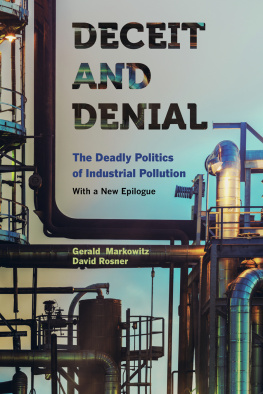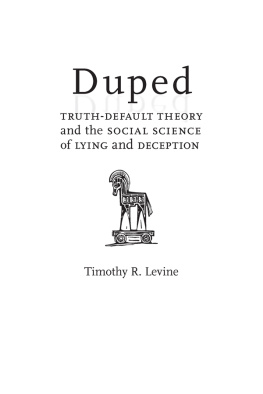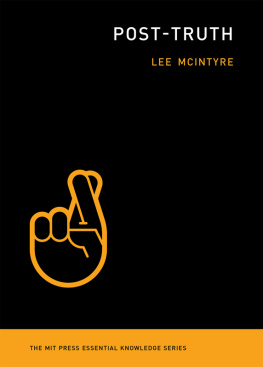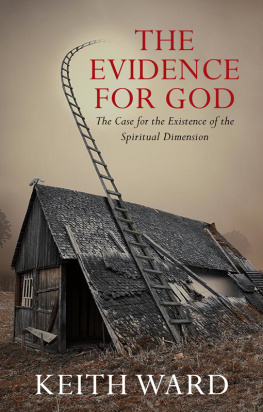The Truth About Denial
The Truth About Denial
Bias and Self- Deception in Science, Politics, and Religion
ADRIAN BARDON


Oxford University Press is a department of the University of Oxford. It furthers the Universitys objective of excellence in research, scholarship, and education by publishing worldwide. Oxford is a registered trade mark of Oxford University Press in the UK and certain other countries.
Published in the United States of America by Oxford University Press
198 Madison Avenue, New York, NY 10016, United States of America.
Oxford University Press 2020
All rights reserved. No part of this publication may be reproduced, stored in a retrieval system, or transmitted, in any form or by any means, without the prior permission in writing of Oxford University Press, or as expressly permitted by law, by license, or under terms agreed with the appropriate reproduction rights organization. Inquiries concerning reproduction outside the scope of the above should be sent to the Rights Department, Oxford University Press, at the address above.
You must not circulate this work in any other form and you must impose this same condition on any acquirer.
CIP data is on file at the Library of Congress
ISBN 9780190062279 (pbk.)
ISBN 9780190062262 (hbk.)
ISBN 9780190062293 (epub.)
Contents
Eighteenth-century philosopher David Hume is justly celebrated for treating the mind as part of nature, rather than as something that belongs to some spiritual realm separate from the material world. Naturalism about the mind just means that the minds operations are natural phenomena that obey rules like any other phenomenon described by science. According to naturalism, the proper study of our mental operations is through natural sciences like biology, neuroscience, and psychology. In offering explanations for various phenomena, the sciences center on the search for causal regularities. In seeking to understand belief as a naturally occurring phenomenon, Hume therefore decided to focus on what causes one to hold a given belief, rather than on what justifies one in holding a belief. This might seem the wrong approach if one felt that (a) ones beliefs about the world are typically well grounded in reasons, and (b) the process of arriving atand acting onthose beliefs is accurately described as one that involves a dispassionate weighing of evidence before reaching a conclusion. But human beings generally do not operate this way, if ever. Hume argued that reason is an essential tool for achieving our ends, but it remains a slave to the passions, in that our actions are ultimately explained by our motivesand reason by itself does not motivate.
The often-insidious influence of unconscious motives on our actions is most apparent in the area of ideology. Philosophers, historians, psychologists, political scientists, and other students of human nature have long noted that we exhibit an enormous susceptibility to unconscious bias in our beliefs. Our interests and emotional needs affect not just our values and choices but also our factual picture of the world around us. In his book on self-deception, psychologist Harry Triandis discussed the many reasons to conclude that people often see what they wish to see, and believe what they wish to believe.of the world is distorted by self-interest, peer influence, prejudice, fear, and favoritism, and we are often not aware of the influence our motives have on our factual understanding of the evidence for our conclusions. Triandis described how we tend to prefer (again, often without self-awareness) explanations of phenomena that conform to our favored view of things. We seek out evidence and opinions that tend to confirm our prejudices; we ignore or avoid unwanted information. At the same time, we routinely view ourselves as more objective in our judgments than our ideological opponents.
An approach to understanding the minds operations that focuses on motives seems particularly apt when our subject of study is ideological or doctrinal belief. Political, religious, and other worldviews include certain ideals and prescriptions, but such worldviews themselves rest on a bedrock of factual claims about the world. Because we are not dispassionate about our ideological commitments, it is exceedingly difficult (indeed, almost unheard of) to be entirely dispassionate in the way we account for them using facts and evidence. The justifications we offer for our ideological positions are suffused by unconscious, implicit bias, and are maintained by selective attention to evidence. Denial is a word we sometimes use in describing the psychological state of those who are self-deceived about the real causes for the beliefs they hold. Any economist will tell you that human behavior is all about incentives. We are increasingly coming to understand that factual belief can work much the same way.
Those with an interest in manipulating public opinion are happy to exploit this aspect of human nature by spinning the truth in ways that appeal to existing prejudices. As a result, ideological partisans wind up disagreeing not just on policy preferences but even on basic facts.
Of late, observers of the U.S. political landscape have been commenting more and more on the alarming ways in which Americans of different political persuasions and cultural, racial, and other identity groups seem not just to disagree on issues but also to be living in different realities. One area where this situation has significant consequences is in the way people can interpret reports of scientific consensus differently, depending on their prejudices and allegiances. Different people, for example, may hear about the science on the human causes of climate change andsincerelyperceive either certainty, uncertainty, or outright hoax. This phenomenon undercuts public discourse on matters where public policy grounded in solid science has never been more essential.
This phenomenon is on a continuum with the way in which different people can look at those living in poverty, and see them either as victims of unfair circumstances or as people who are complicit in a culture of irresponsibility and dependency. Different people will consider a given refugee population, and see either an alien threat to our way of life or deserving potential members of our society. Different people will see a video of a police shooting; some will see justification and others will see murder.
An environment of polarization, prejudice, bias, and willful self-deception, combined with an often misleading political and media environment, is toxic for political discourse. Polarization on matters of fact is affecting progress on matters of critical public importance, such as action on climate.
Research on denial has exploded over just the last few years. This includes game-changing work from social, political, cognitive, and evolutionary psychology, as well as from sociology, communication studies, political science, history, and philosophy. My goal has been to bring this diverse work together for the reader while, I hope, convincing readers of the urgent importance of gaining a better understanding of unconscious bias and self-deception. Denial concerns all of usboth as victims and as perpetratorsand so this work is intended not just for an academic audience; it is for everyone.
Harry Triandis, Fooling Ourselves: Self-Deception in Politics, Religion, and Terrorism


